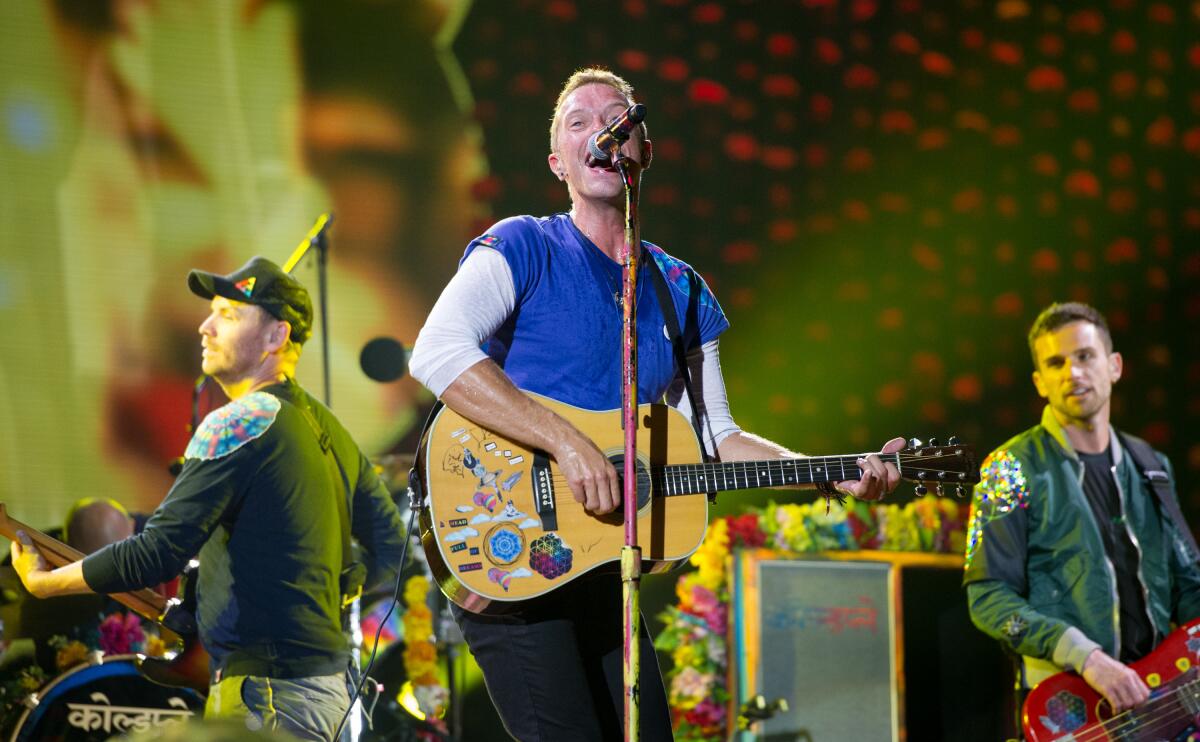Review: Brit-rock royals Coldplay go glamping in Africa on ambitious but clumsy ‘Everyday Life’

“What in the world are we going to do?” Coldplay’s Chris Martin asks to start the title track of his group’s new double album, “Everyday Life.” “Look at what everybody’s going through.”
Lush with creamy keyboards and gently arcing guitar licks, the music around him is just what we’ve come to expect from this weighted blanket of a rock band — as quintessentially Coldplay as that opening couplet, which is vague enough to encompass any trauma a listener might bring to it.
“Everyone hurts / Everyone cries,” the singer goes on, which of course is no less true today than it was when R.E.M. made the same point nearly 30 years ago.
But if Coldplay has endured by dispensing a kind of all-purpose reassurance — it remains, two decades after it emerged from Britain’s post-Radiohead sweepstakes, one of the few non-boomer guitar acts capable of filling stadiums — Martin actually spends much of the band’s eighth LP pushing past the feel-good generalities that made him rock’s cuddliest heartthrob.
Martin began back in the “Yellow” days by re-scaling U2’s “The Joshua Tree” to student-union dimensions; over time the group slowly went bigger and slicker, eventually racking up collaborations with the likes of Rihanna and the Chainsmokers. But even as he became a real-deal celebrity, Martin’s presentation remained nice-guy opaque.
Here, in contrast, over the swirling psych-folk groove of “Church,” he works a surprisingly intimate sex-as-religion metaphor — catnip for folks who wonder about his love life following his and Gwyneth Paltrow’s “conscious uncoupling” — while the disarming “Daddy” zooms in unusually close on the relationship between a father and child: “Look, Dad, we got the same hair.”
At times, good isn’t even the feeling Martin is after, as in “Guns,” a bitterly sarcastic acoustic rant about folks arming themselves to the teeth, and the eerie and menacing “Trouble in Town,” which features what sounds like a body-cam recording of an abusive cop.
Put it this way: Martin has been sufficiently roiled by stories of racist attacks and kids in cages that he drops F-bombs in more than one track, which has to be a first for a Coldplay record.
In a search for further detail — or perhaps to leave behind the chaos of Trump and Brexit for a bit — the group went globetrotting, like British Isles royals Sting and Bono before it, for “Everyday Life,” pulling in sounds from Africa and the Middle East that distinguish this set from Coldplay’s recent dabblings in white-guy R&B and soft-touch EDM. (To celebrate the album’s release, Coldplay — Martin along with guitarist Jonny Buckland, bassist Guy Berryman and drummer Will Champion — will livestream a gig from Jordan on Friday instead of doing a full tour, which the band says it’s delaying until it can figure out how to travel in an environmentally sustainable fashion.)
And musically, at least, that journey paid off. The gorgeous “Bani Adam” benefits from a sample of a piece by the Nigerian composer Ikoli Harcourt Whyte; “Arabesque,” with a blaring saxophone solo by Femi Kuti, gathers a swaggering momentum we’ve never heard from Coldplay. (Other guests include Tiwa Savage, a Nigerian singer Beyoncé also drafted for her “Lion King” album; pop super-producer Max Martin; and Chris Martin’s 13-year-old son, Moses, who gets a co-writing credit on “Orphans.”) Then there’s the delicate “Èkó,” which openly invites comparisons to the work of an earlier traveler, Paul Simon, whom Coldplay evokes again in “Old Friends.”
But where Simon in his lyrics always seemed determined to catch something of the complexity of the place he was visiting, Martin can be awfully simplistic in these songs — a problem in any context but especially on an album otherwise marked by some of his most nuanced words.
“In Africa the rivers are perfectly deep and perfectly wide,” he sings in “Èkó,” practically begging us to picture him in a pith helmet. “In Africa the mothers will sing you to sleep and say, ‘It’s all right.’” (All the rivers? Every mother?)
Though you can appreciate his looking beyond himself — as in “Orphans,” which somewhat clumsily attempts to channel the frustration of kids displaced by war in Syria — the result feels even more blandly universalized than Coldplay’s old moon-June love songs.
Fortunately, “Everyday Life” doesn’t end before Martin tries to rouse our can-do spirit with “Champion of the World,” a would-be anthem in which he’s “heading upwards from the Earth” with — wait for it — “E.T. on my bicycle.”
Say what you want about the ungainliness of the image. But you can’t deny the chutzpah it took to put it out there.
More to Read
The biggest entertainment stories
Get our big stories about Hollywood, film, television, music, arts, culture and more right in your inbox as soon as they publish.
You may occasionally receive promotional content from the Los Angeles Times.











